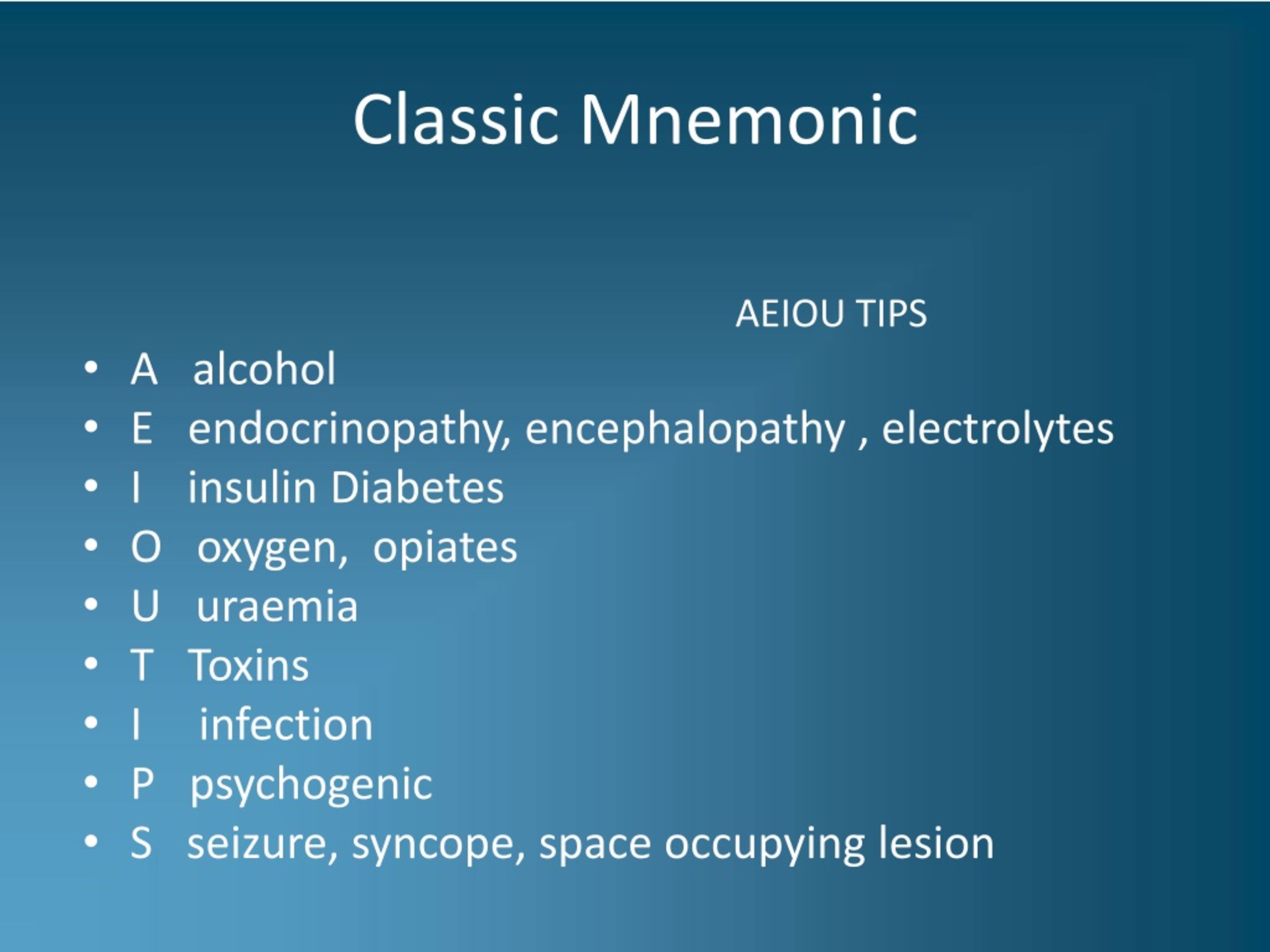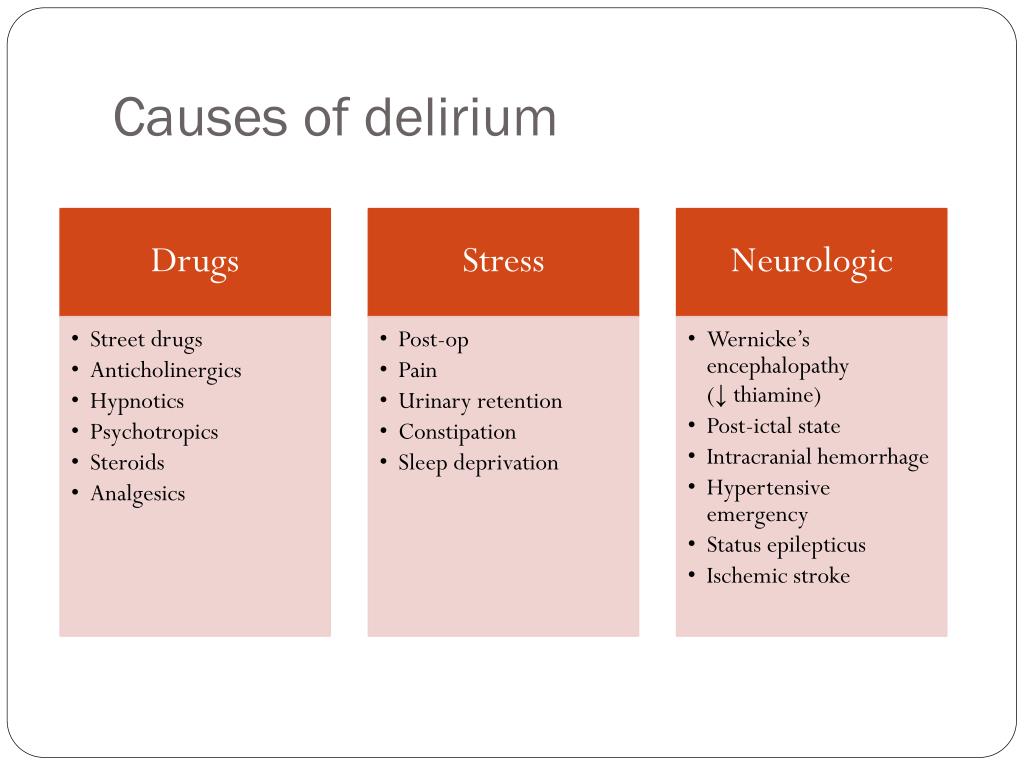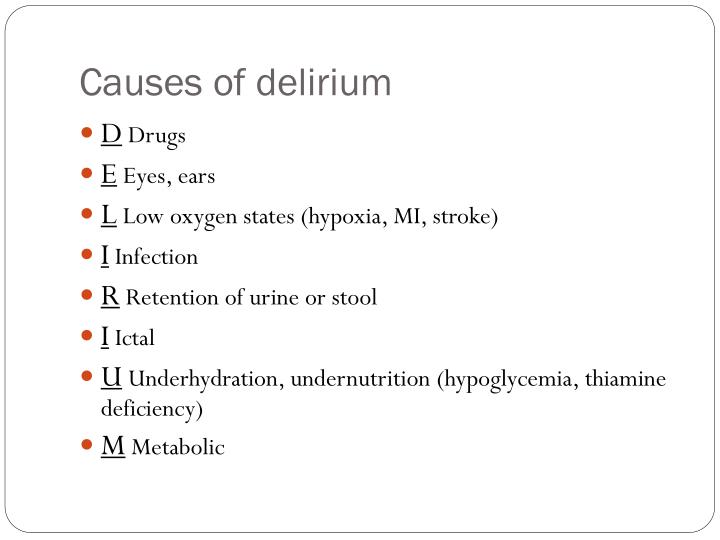
AEIOU TIPS Mnemonic for Causes of Altered Mental GrepMed
Delirium is a type of confusion that happens when the combined strain of illnesses, environmental circumstances or other risk factors disrupts your brain function. It's more common in adults over 65. This condition is serious and can cause long-term or permanent problems, especially with delays in treatment. However, it's also often.

Delirium and Dementia Semantic Scholar
One mnemonic to consider when thinking about the differential causes of delirium is DR.DRE, composed of Disease Remediation, Drug Removal (screening for both drug related delirium and withdrawal syndromes), and Environment. The use of this mnemonic helps consider the most common risk factors and may be particularly useful for communication.

DELIRIUM Mnemonic for causes Nursing Student Tips, Nursing School Studying, Nursing School Notes
Delirium, also termed as 'acute confusional state', 'toxic or metabolic encephalopathy', 'acute brain failure', is essentially defined by the Diagnostic and Statistical Manual of Mental Disorders, Fifth Edition (DSM-5) criteria as an acute change in attention and awareness that develops over a relatively short time interval and associated with additional cognitive deficits such as memory.

How to remember the common causes of delirium Mnemonic of the day is PINCH ME for delirium. Of
Causes of delirium can very from patient to patient but most common is a source of infection like a uti or even skin or wound infection. other more causes like stroke or cardiac tend to be more symptomatic and acute. The input of the family plays a significant role in he diagnosis of a delirium pt.

Delirium Causes PInCH ME Mnemonic Jon Carter GrepMed
L aboratory abnormalities. Especially hyponatremia, azotemia, hyperbilirubinemia, hypocalcemia and metabolic acidosis. I nfection. Sepsis and severe sepsis. Especially urinary, respiratory tract infections. R espiratory. Consider respiratory failure (PCO2 greater than 45 mmHg or PO2 less than 55 mmHg or oxygen saturation less than 88%).

Causes of delirium (''I WATCH DEATH'').* Download Table
The mnemonic acronym DIMS—derived from drug, infection, metabolic, and structural and systems—is commonly used to aid in the assessment of delirium triggers. Although it is a concise tool, the DIMS framework only covers the most overt triggers.. Delirium is a common and serious condition with multiple predisposing and precipitating.

PPT Confusion et al PowerPoint Presentation, free download ID301958
AEIOU TIPS is a mnemonic for the causes of delirium or a differential diagnosis for confusion. Learn the causes of an Altered Mental Status using the AEIOU.

Pathogenesis Of Delirium Mnemonic Medicalsupernotes
The pathophysiologic cause of delirium is not well understood. 1 Older age, multiple comorbidities,. Mnemonic Possible etiology; DELIRIUM 19: Drugs, dehydration, deficiencies, discomfort (pain).

Patients Gone Wild Agitation and Delirium in the ICU
Delirium is an acute, transient, usually reversible, fluctuating disturbance in attention, cognition, and consciousness level. Causes include almost any disorder or drug. Diagnosis is clinical, with laboratory and usually imaging tests to identify the cause. Treatment is correction of the cause and supportive measures.

Week 8 Delirium in the elderly Strata5 Nrtaylor101 Delirium GrepMed
Delirium is a serious change in mental abilities. It results in confused thinking and a lack of awareness of someone's surroundings. The disorder usually comes on fast — within hours or a few days. Delirium can often be traced to one or more factors. Factors may include a severe or long illness or an imbalance in the body, such as low sodium.

PPT Delirium PowerPoint Presentation, free download ID5526533
Delirium is a clinical syndrome that usually develops in the elderly. It is characterized by an alteration of attention, consciousness, and cognition, with a reduced ability to focus, sustain or shift attention. It develops over a short period of time and fluctuates during the day. The clinical presentation can vary, usually with psychomotor behavioral disturbances such as hyperactivity or.

🌀 Delirium cause Mnemonic 🌀 YouTube
Delirium Assessment & Management. Delirium is an acute, transient and reversible state of confusion, usually the result of other organic processes (infection, drugs, dehydration), the onset is acute and the cognition of the patient can be highly fluctuant over a short period of time. One in five elderly patients on medical and surgical wards.

Understanding and Treating Delirium
The differential diagnosis of Delirium using the DELIRIUMS mnemonic Common etiologies of delirium: Remember: delirium usually has more than one cause D Drug effect or withdrawal: benzos, narcotics, EtOH, SSRI, anticholinergics, Digoxin, antihistamines, muscle/bladder relaxants; especially in the elderly, even in low doses. Drugs also cover toxins and heavy metals. E Environmental factors.

Delirium Mnemonics (Memorable Psychiatry Lecture) YouTube
Mnemonic for Causes of Delirium (IWATCHDEATH) 1 of 1 Pages I-WATCH-DEATH is a mnemonic widely used in clinical practice to alert healthcare providers to common causes of delirium, and can help to support bedside assessments, diagnostic testing, and clinical decision-making. Infectious (encephalitis, meningitis, urinary tract infection, pneumonia)

PPT Delirium PowerPoint Presentation ID5526533
Delirium is an acute disorder of fluctuating attention and awareness with cardinal features that allow it to be positively distinguished from other causes of an acute confusional state. These features include fluctuations, prominent inattentiveness with other cognitive deficits, a change in awareness and visual hallucinations. We describe a framework for diagnosing delirium, noting the need to.

Causes Of Delirium Mnemonic
Step 3: Investigate potential causes of delirium. • Delirium has a wide variety of etiologies which may occur alone or in combination. • No clear cause has been found in approximately 10% of cases. • Once delirium is identified, a thorough search for underlying causes must be conducted. Table 1: Selected etiologies of delirium and examples
- Loops In On A Thread
- Nsw Department Of Enterprise Investment And Trade
- Hume Highway Food Stops Victoria
- Cheap Flights To Fiji From Sydney
- Gordon Ramsay Food Stars Winner
- Short Usb To Usb Cable
- Takuapa Old Town Khao Lak
- 88 Degrees Celsius To Fahrenheit
- 1916 Half Penny Australia Value
- All Hallows Church Five Dock